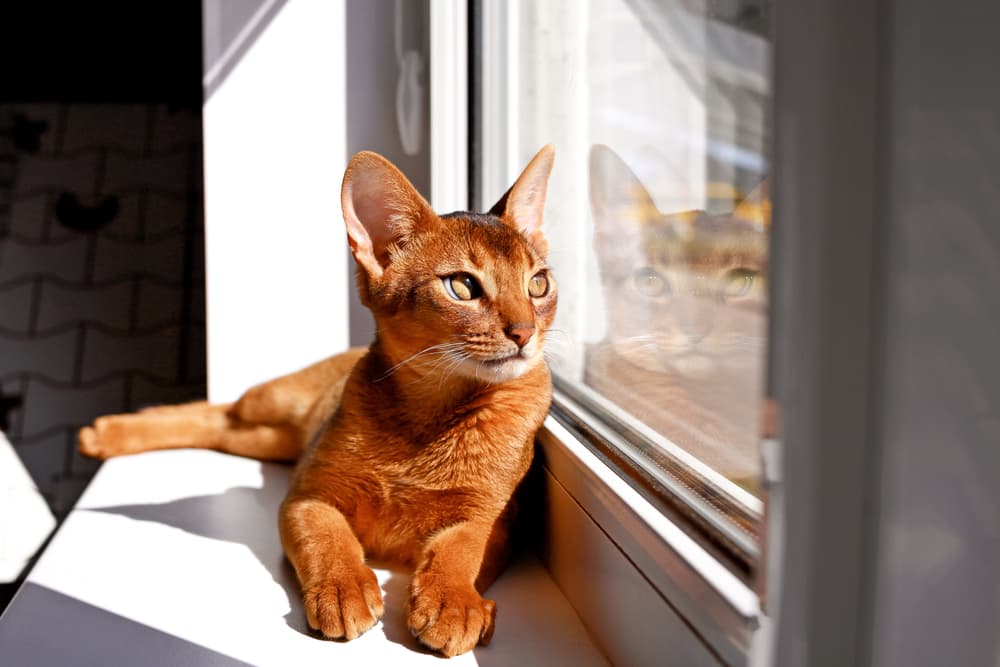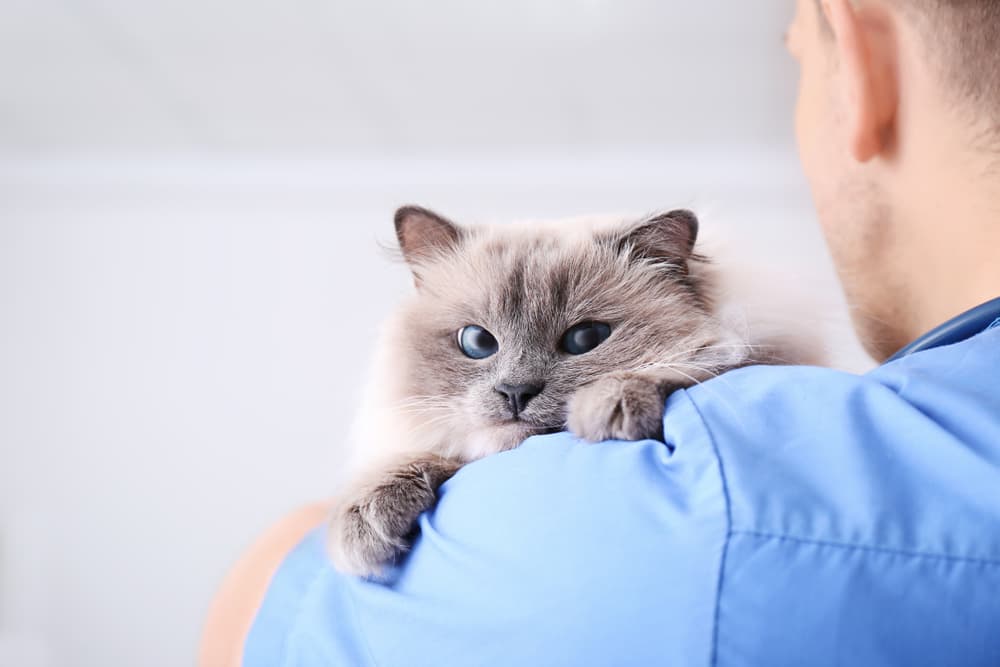Enlarged Heart (Dilated Cardiomyopathy) in Cats

Overview
Although heart disease that causes an enlarged heart in cats is relatively uncommon nowadays, it is still something that can affect our feline friends. In this article, you will learn what dilated cardiomyopathy is, the causes of it, the symptoms of heart disease in cats, and treatment options.
What is Dilated Cardiomyopathy?

Dilated cardiomyopathy, DCM for short, is a disease of heart muscles, specifically the ventricular muscles, which are responsible for pumping blood forward and through the blood. In DCM, the heart muscles weaken over time resulting in a big, weak, floppy heart. Dilated chambers in the heart have a reduced ability to contract and push blood through the body’s blood vessels. A heart affected by DCM becomes overloaded with blood, and can result in congestive heart failure.
Thirty years ago, DCM was one of the leading causes of heart failure in cats. It was theorized that DCM in cats was due to a dietary deficiency of an essential amino acid called taurine. Most cat foods manufacturers began supplementing their foods with taurine, and now DCM is rarely seen in cats, and accounts for around 10 percent of heart disease seen in cats (1).
Causes of an Enlarged Heart in Cats

Before 1987, dilated cardiomyopathy was the most common type of heart disease diagnosed in cats. Thanks to dietary modifications in commercial cat foods, now DCM in cats is relatively rare. In the past, it was theorized that taurine deficiency was the main culprit of feline DCM. Today, the underlying cause in the majority of DCM in cats is unknown. In some families of cats, a genetic predisposition has been identified, just like in humans.
While dilated cardiomyopathy can affect any cat of any age, Asian breeds, including Persians, Burmese, Abyssinian, Siamese, seem to be disproportionately affected. DCM can also be the result of end-stage heart failure due to other heart disease in cats, including hypertrophic cardiomyopathy and restrictive cardiomyopathy, both of which are more common in cats than DCM.
Symptoms of DCM in Cats

The most common signs associated with any type of heart disease in cats are rapid breathing (sometimes open-mouth), decreased appetite, and decreased energy levels. Sometimes, cats with heart disease don’t show any signs. Other times, they may hide, not want to eat, or act non-specifically sick. Other more severe symptoms of heart disease in cats include:
- Pale or bluish tinge to gums
- Weakness
- Racing heart
- Collapse
- Sudden onset of inability to move hindlimb due to paralysis and/or severe hindlimb pain (caused by a blocked blood vessel called a thromboembolism)
If you notice any of these signs in your cat, make an appointment to see your veterinarian as soon as possible. Heart disease can progress quickly in cats and become life-threatening. Remember a cat’s instinct is to hide any signs of sickness, so if your cat is showing you that they are sick, then they need to see a vet ASAP to determine what is causing the problem.
Diagnosing Dilated Cardiomyopathy in Cats

A veterinarian will use a combination of oral history from you and physical examination of the cat including taking vitals and listening to the heart and lungs with a stethoscope. Depending what the veterinarian notices on physical exam, they will recommend diagnostic testing, which can include:
- Chest radiographs (X-rays)
- Heart ultrasound (echocardiogram)
- Electrocardiogram
- Blood work (CBC, Blood Chemistry, thyroid testing, taurine testing, heart biomarkers)
Treatment for an Enlarged Heart in Cats

Cats that are suffering from congestive heart failure due to DCM are usually very sick and require hospitalization to be stabilized. They may need to be put in an oxygen cage to make it easier for them to breathe.
DCM often causes fluid buildup around the lungs that can make it hard to breathe, and using a needle and syringe to remove that fluid (in a procedure called thoracocentesis) is used to help cats breathe. Veterinarians often submit the fluid for testing as well. Even on medication, some cats will require intermittent thoracocentesis to remove fluid from their chest.
Medications for Managing DCM in Cats
Heart medication is the long term treatment of choice for managing DCM in cats. Prescribed medications can include:
- Furosemide, a diuretic that removes excess fluid from the body
- Pimobendan, to strengthen the heart muscle and dilate blood vessels so the heart can pump blood more effectively, alternatively digoxin may be prescribed
- Blood vessel dilators to reduce the work the heart has to do to move blood through the body
- Anti-arrhythmia heart medication if clinically indicated
- Taurine supplementation if clinically indicated
Caring for a Cat with DCM
Cats with DCM should be kept indoors only in a low stress environment. These cats often have a poor appetite, so ask your veterinarian for food recommendations to tempt your cat to eat. Avoid foods that are high in salt; some cats may need a low sodium diet.
Recheck Appointments
If your cat has DCM, it is very important to work closely with your veterinarian and report how your cat responds to therapy and any symptoms as soon as possible. Your veterinarian will need to see your cat back for rechecks fairly frequently to check how they are responding to treatment. Some medications, such as furosemide, must be accurately dosed, as too much will cause dehydration and electrolyte imbalances and kidney issues, and too little will not be effective. During recheck appointments, your veterinarian will:
- Examine your cat
- Take their blood pressure
- Take blood samples to ensure that your cat is responding appropriately to medication and that there are no negative side effects
Prognosis for Cats with DCM
Unfortunately, DCM in cats that is not related to a taurine deficiency carries a poor prognosis, and survival even with treatment is usually weeks to months after initial diagnosis.
How to Prevent DCM in Cats

Ensure that your cat is eating a high quality cat food that contains animal protein to prevent a taurine deficiency. Do not feed cats a vegetarian or vegan diet. Have your cat’s health and heart checked by a veterinarian once a year to catch any problems early.
Related conditions
- Congestive heart failure
- Thromboembolism
- Pleural effusion
- Hypertrophic cardiomyopathy









